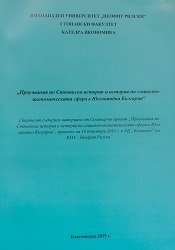ТЪРГОВСКИ МРЕЖИ И КОНТАКТИ: ПРИМЕРЪТ НА ПУЛИЕВИ (30-ТЕ ― 60-ТЕ ГОД. НА XIX В.)
MERCANTILE NETWORKS AND CONTACTS: PULIEVI’S EXAMPLE (1830S – 1860S)
Author(s): Ivaylo Naydenov
Subject(s): History, Economy
Published by: ЮГОЗАПАДЕН УНИВЕРСИТЕТ »НЕОФИТ РИЛСКИ«
Keywords: Bulgarian Revival Period; Pulievi; mercantile network; agricultural and craft products; letter books; merchant ledgers; business practices; “friends”
Summary/Abstract: One of the most powerful Bulgarian merchant houses during the Revival period (18th – 19th centuries) was “Pulievi-Georgievi”. Two of the partners – Hristo and Nikola Pulievi continued the business ventures of their father – Teodor Puliev in Galatz and Braila. Pulievi’s nephews (Evlogi and Hristo Georgiev) were also involved in the activities of the firm (Evlogi in 1839) and Hristo (from 1841 onwards). Evlogi’s younger brother Hristo began his entrepreneurial career settling down pеrmanently in the town of Bucharest and Evlogi moved to Galatz. In their turn, Pulievi settled down in Karlovo (after 1841) and continued to deliver products to their relatives. From this point of view “Pulievi-Georgievi” firm is a representative example for family-based company.289The main aim of this paper is to reveal Pulievi’s trade activities. I have chosen that period because in 1839 was established the firm “Pulie-vi-Georgievi”. On the other hand, in 1868 Nikola T. Pulievi passed away.On the basis of the preserved letters, one can say that from 1839 to 1841 Hristo T. Puliev was buying and exporting mainly agricultural products, hides, cloths, aba and so forth in Galatz where his brother Nikola resided according to the merchant contract signed on 1 January 1839. Hristo’s activities were restricted to Karlovo, Filibe (Plovdiv) and Pazardzhik. After 1841, Hristo and Nikola T. Pulievi managed to expand their activities across Ottoman Bulgaria. Around 33 settlements are registered in Pulievi’s letter books and merchant ledgers. After Hristo’s death Nikola continued the joint business ventures with the assistance of Stefan P. Vasilev. They continued to deal with agricultural and craft products after the Crimean War. During that period, their activities spread in 22 settlements. It is obvious that Hristo and Nikola Pulievi restricted their business ventures mainly to the Bulgarian lands in contrast to the business activities (and mercantile networks) of other entrepreneurs during the Bulgarian Revival (XVIIIth –XIXth century).In conclusion I would like to point out that Pulievi’s mercantile network is representative one for the establishment of long-lasting “circle of friends” which was the basis for Pulievi’s successful business activities.
Book: Проучвания по Стопанска история и история на социално-икономическата сфера в Югозападна България
- Page Range: 287-316
- Page Count: 30
- Publication Year: 2015
- Language: Bulgarian
- Content File-PDF

